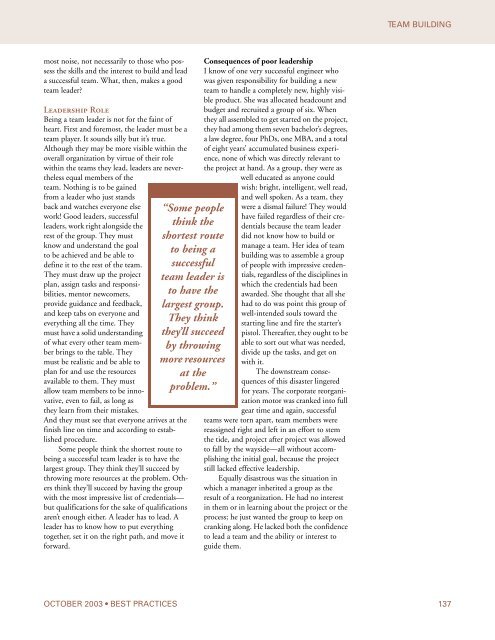October - Center for Information-Development Management
October - Center for Information-Development Management
October - Center for Information-Development Management
Create successful ePaper yourself
Turn your PDF publications into a flip-book with our unique Google optimized e-Paper software.
TEAM BUILDINGmost noise, not necessarily to those who possessthe skills and the interest to build and leada successful team. What, then, makes a goodteam leader?Leadership RoleBeing a team leader is not <strong>for</strong> the faint ofheart. First and <strong>for</strong>emost, the leader must be ateam player. It sounds silly but it’s true.Although they may be more visible within theoverall organization by virtue of their rolewithin the teams they lead, leaders are neverthelessequal members of theteam. Nothing is to be gainedfrom a leader who just standsback and watches everyone elsework! Good leaders, successfulleaders, work right alongside therest of the group. They mustknow and understand the goalto be achieved and be able todefine it to the rest of the team.They must draw up the projectplan, assign tasks and responsibilities,mentor newcomers,provide guidance and feedback,and keep tabs on everyone andeverything all the time. Theymust have a solid understandingof what every other team memberbrings to the table. Theymust be realistic and be able toplan <strong>for</strong> and use the resourcesavailable to them. They mustallow team members to be innovative,even to fail, as long asthey learn from their mistakes.And they must see that everyone arrives at thefinish line on time and according to establishedprocedure.Some people think the shortest route tobeing a successful team leader is to have thelargest group. They think they’ll succeed bythrowing more resources at the problem. Othersthink they’ll succeed by having the groupwith the most impressive list of credentials—but qualifications <strong>for</strong> the sake of qualificationsaren’t enough either. A leader has to lead. Aleader has to know how to put everythingtogether, set it on the right path, and move it<strong>for</strong>ward.“Some peoplethink theshortest routeto being asuccessfulteam leader isto have thelargest group.They thinkthey’ll succeedby throwingmore resourcesat theproblem.”Consequences of poor leadershipI know of one very successful engineer whowas given responsibility <strong>for</strong> building a newteam to handle a completely new, highly visibleproduct. She was allocated headcount andbudget and recruited a group of six. Whenthey all assembled to get started on the project,they had among them seven bachelor’s degrees,a law degree, four PhDs, one MBA, and a totalof eight years’ accumulated business experience,none of which was directly relevant tothe project at hand. As a group, they were aswell educated as anyone couldwish: bright, intelligent, well read,and well spoken. As a team, theywere a dismal failure! They wouldhave failed regardless of their credentialsbecause the team leaderdid not know how to build ormanage a team. Her idea of teambuilding was to assemble a groupof people with impressive credentials,regardless of the disciplines inwhich the credentials had beenawarded. She thought that all shehad to do was point this group ofwell-intended souls toward thestarting line and fire the starter’spistol. Thereafter, they ought to beable to sort out what was needed,divide up the tasks, and get onwith it.The downstream consequencesof this disaster lingered<strong>for</strong> years. The corporate reorganizationmotor was cranked into fullgear time and again, successfulteams were torn apart, team members werereassigned right and left in an ef<strong>for</strong>t to stemthe tide, and project after project was allowedto fall by the wayside—all without accomplishingthe initial goal, because the projectstill lacked effective leadership.Equally disastrous was the situation inwhich a manager inherited a group as theresult of a reorganization. He had no interestin them or in learning about the project or theprocess; he just wanted the group to keep oncranking along. He lacked both the confidenceto lead a team and the ability or interest toguide them.OCTOBER 2003 • BEST PRACTICES 137





